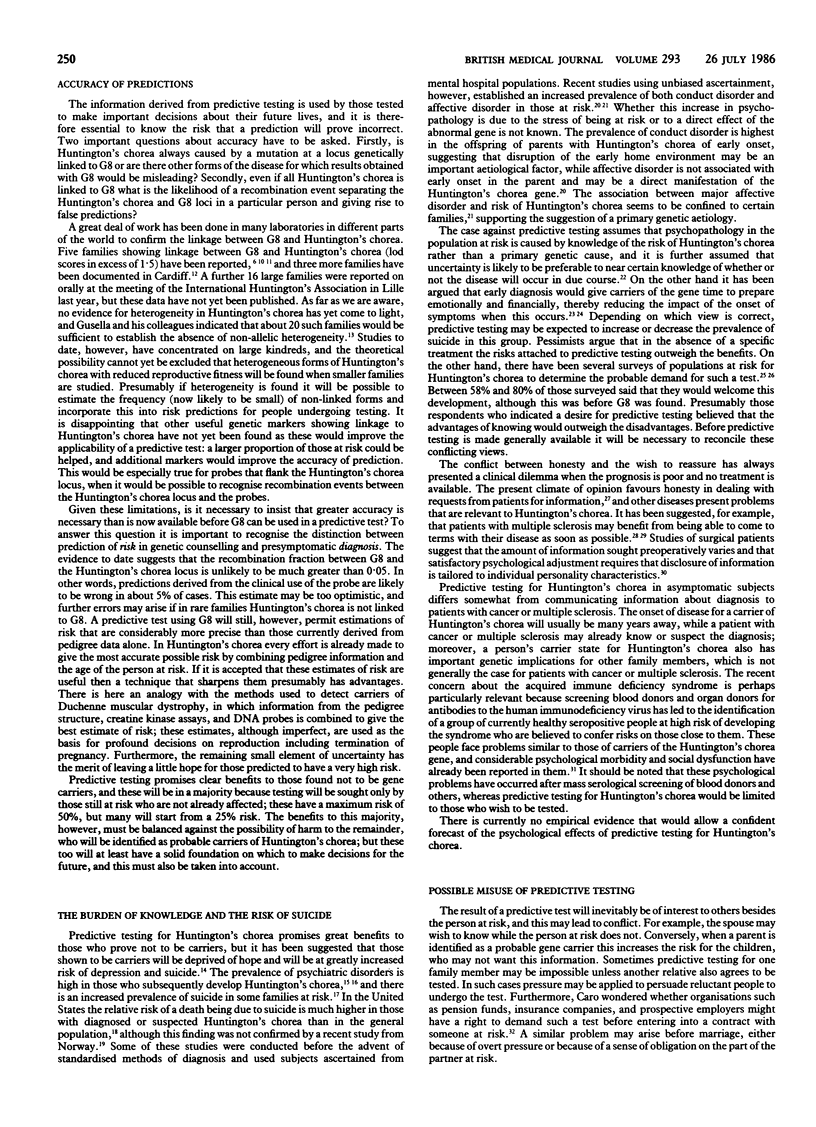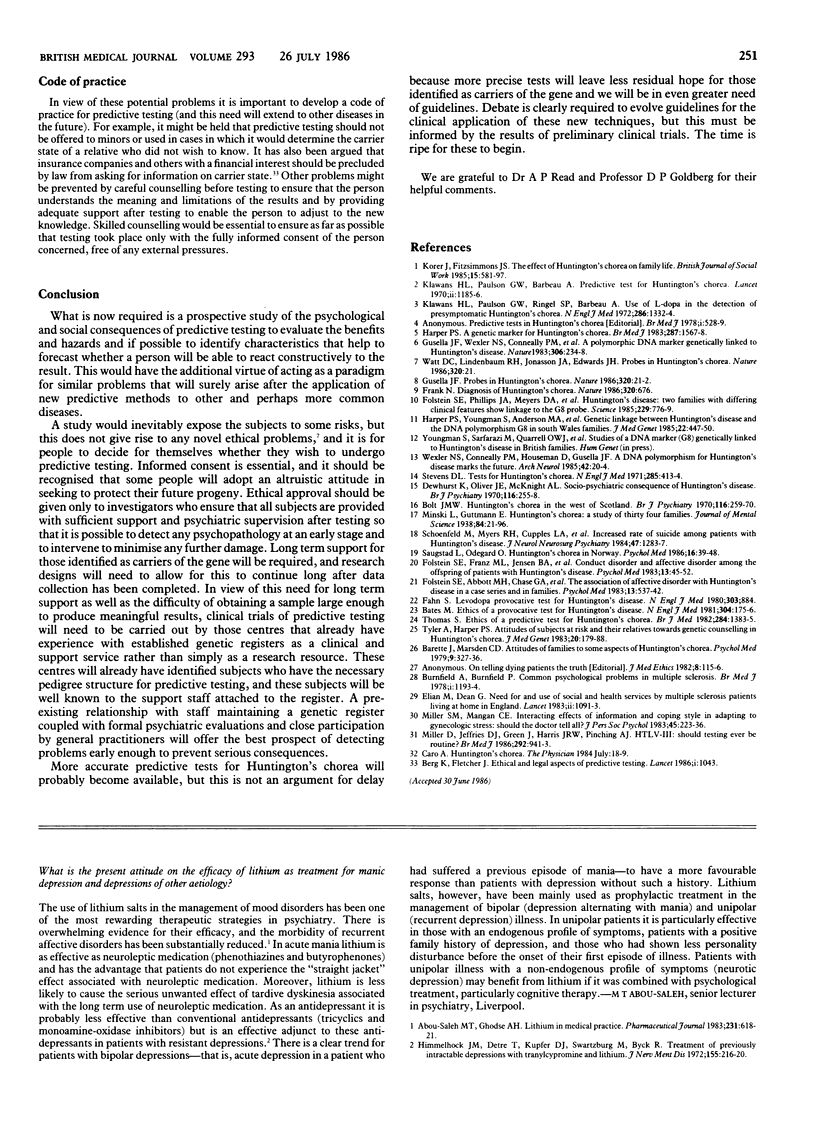Abstract
The finding of a genetically linked polymorphic DNA marker has made possible a predictive test for Huntington's chorea. This DNA probe has so far been used only for research and has technical limitations, but some workers now wish to apply it to clinical predictions. Those identified by the probe as being probable carriers of the Huntington's chorea gene would be exposed to uncertain psychological risks and social pressures. Ethical guidelines should be established, but these require greater knowledge of the potential benefits and hazards of this powerful new procedure. Controlled clinical trials are urgently needed.
Full text
PDF


Selected References
These references are in PubMed. This may not be the complete list of references from this article.
- Barette J., Marsden C. D. Attitudes of families to some aspects of Huntington's chorea. Psychol Med. 1979 May;9(2):327–336. doi: 10.1017/s0033291700030841. [DOI] [PubMed] [Google Scholar]
- Bates M. Ethics of provocative test for Huntington's disease. N Engl J Med. 1981 Jan 15;304(3):175–176. doi: 10.1056/NEJM198101153040319. [DOI] [PubMed] [Google Scholar]
- Berg K., Fletcher J. Ethical and legal aspects of predictive testing. Lancet. 1986 May 3;1(8488):1043–1043. doi: 10.1016/s0140-6736(86)91320-6. [DOI] [PubMed] [Google Scholar]
- Bolt J. M. Huntington's chorea in the West of Scotland. Br J Psychiatry. 1970 Mar;116(532):259–270. doi: 10.1192/bjp.116.532.259. [DOI] [PubMed] [Google Scholar]
- Elian M., Dean G. Need for and use of social and health services by multiple sclerosis patients living at home in England. Lancet. 1983 May 14;1(8333):1091–1093. doi: 10.1016/s0140-6736(83)91922-0. [DOI] [PubMed] [Google Scholar]
- Fahn S. Levodopa provocative test for Huntington's disease. N Engl J Med. 1980 Oct 9;303(15):884–884. doi: 10.1056/NEJM198010093031517. [DOI] [PubMed] [Google Scholar]
- Folstein S. E., Franz M. L., Jensen B. A., Chase G. A., Folstein M. F. Conduct disorder and affective disorder among the offspring of patients with Huntington's disease. Psychol Med. 1983 Feb;13(1):45–52. doi: 10.1017/s0033291700050054. [DOI] [PubMed] [Google Scholar]
- Folstein S. E., Phillips J. A., 3rd, Meyers D. A., Chase G. A., Abbott M. H., Franz M. L., Waber P. G., Kazazian H. H., Jr, Conneally P. M., Hobbs W. Huntington's disease: two families with differing clinical features show linkage to the G8 probe. Science. 1985 Aug 23;229(4715):776–779. doi: 10.1126/science.2992086. [DOI] [PubMed] [Google Scholar]
- Folstein S., Abbott M. H., Chase G. A., Jensen B. A., Folstein M. F. The association of affective disorder with Huntington's disease in a case series and in families. Psychol Med. 1983 Aug;13(3):537–542. doi: 10.1017/s0033291700047966. [DOI] [PubMed] [Google Scholar]
- Harper P. S. A genetic marker for Huntington's chorea. Br Med J (Clin Res Ed) 1983 Nov 26;287(6405):1567–1568. doi: 10.1136/bmj.287.6405.1567. [DOI] [PMC free article] [PubMed] [Google Scholar]
- Harper P. S., Youngman S., Anderson M. A., Sarfarazi M., Quarrell O., Tanzi R., Shaw D., Wallace P., Conneally P. M., Gusella J. F. Genetic linkage between Huntington's disease and the DNA polymorphism G8 in South Wales families. J Med Genet. 1985 Dec;22(6):447–450. doi: 10.1136/jmg.22.6.447. [DOI] [PMC free article] [PubMed] [Google Scholar]
- Himmelhoch J. M., Detre T., Kupfer D. J., Swartzburg M., Byck R. Treatment of previously intractable depressions with tranylcypromine and lithium. J Nerv Ment Dis. 1972 Sep;155(3):216–220. doi: 10.1097/00005053-197209000-00009. [DOI] [PubMed] [Google Scholar]
- Klawans H. L., Jr, Paulson G. W., Ringel S. P., Barbeau A. Use of L-dopa in the detection of presymptomatic Huntington's chorea. N Engl J Med. 1972 Jun 22;286(25):1332–1334. doi: 10.1056/NEJM197206222862503. [DOI] [PubMed] [Google Scholar]
- Miller D., Jeffries D. J., Green J., Harris J. R., Pinching A. J. HTLV-III: should testing ever be routine? Br Med J (Clin Res Ed) 1986 Apr 5;292(6525):941–943. doi: 10.1136/bmj.292.6525.941. [DOI] [PMC free article] [PubMed] [Google Scholar]
- Miller S. M., Mangan C. E. Interacting effects of information and coping style in adapting to gynecologic stress: should the doctor tell all? J Pers Soc Psychol. 1983 Jul;45(1):223–236. doi: 10.1037//0022-3514.45.1.223. [DOI] [PubMed] [Google Scholar]
- Saugstad L., Odegård O. Huntington's chorea in Norway. Psychol Med. 1986 Feb;16(1):39–48. doi: 10.1017/s0033291700002518. [DOI] [PubMed] [Google Scholar]
- Schoenfeld M., Myers R. H., Cupples L. A., Berkman B., Sax D. S., Clark E. Increased rate of suicide among patients with Huntington's disease. J Neurol Neurosurg Psychiatry. 1984 Dec;47(12):1283–1287. doi: 10.1136/jnnp.47.12.1283. [DOI] [PMC free article] [PubMed] [Google Scholar]
- Thomas S. Ethics of a predictive test for Huntington's chorea. Br Med J (Clin Res Ed) 1982 May 8;284(6326):1383–1385. doi: 10.1136/bmj.284.6326.1383. [DOI] [PMC free article] [PubMed] [Google Scholar]
- Tyler A., Harper P. S. Attitudes of subjects at risk and their relatives towards genetic counselling in Huntington's chorea. J Med Genet. 1983 Jun;20(3):179–188. doi: 10.1136/jmg.20.3.179. [DOI] [PMC free article] [PubMed] [Google Scholar]
- Waters W. E. Headache and the eye. A community study. Lancet. 1970 Jul 4;2(7662):1–4. doi: 10.1016/s0140-6736(70)92471-2. [DOI] [PubMed] [Google Scholar]
- Watt D. C., Lindenbaum R. H., Jonasson J. A., Edwards J. H. Probes in Huntington's chorea. Nature. 1986 Mar 6;320(6057):21–22. doi: 10.1038/320021a0. [DOI] [PubMed] [Google Scholar]
- Wexler N. S., Conneally P. M., Housman D., Gusella J. F. A DNA polymorphism for Huntington's disease marks the future. Arch Neurol. 1985 Jan;42(1):20–24. doi: 10.1001/archneur.1985.04060010026009. [DOI] [PubMed] [Google Scholar]


